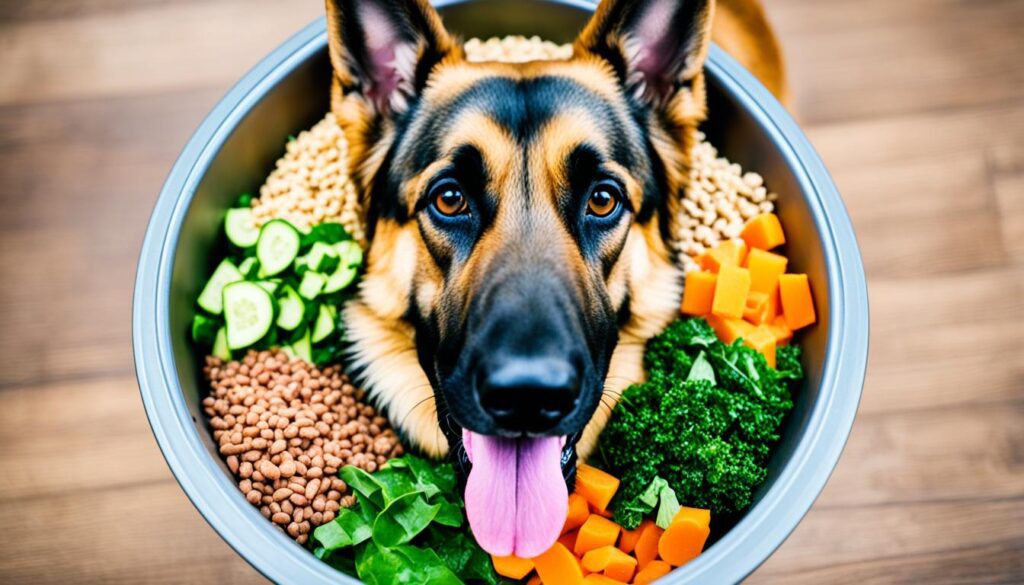Caring for Your German Shepherd When Pregnant
Did you know that the gestation period for German Shepherds is approximately 63 to 65 days? That’s just over two months of caring for your pregnant furry companion and ensuring her well-being and the health of her puppies. During this crucial time, it’s essential to provide proper care and nutrition to support a successful pregnancy.
When a German Shepherd is pregnant, it’s important to be aware of the signs of pregnancy, such as weight gain, a swollen stomach, increased appetite, fatigue, irritability, and nesting behavior. Regular check-ups with a veterinarian are crucial to monitor the progress of the pregnancy and address any complications that may arise.
In this article, we’ll guide you through the different stages of your German Shepherd’s pregnancy and provide tips on diet and nutrition, care and preparation for whelping, and overall pregnant German Shepherd care. Let’s ensure a healthy and successful journey for your beloved German Shepherd and her soon-to-be adorable puppies!
Diet and Nutrition for a Pregnant German Shepherd
Proper diet and nutrition play a crucial role in ensuring the health and well-being of a pregnant German Shepherd. During this critical phase, it is important to provide the right balance of nutrients to support the development of the mother and her growing puppies. Here are some essential guidelines to follow for a healthy and successful pregnancy:
High-Quality Adult Dog Food
A pregnant German Shepherd should be fed a high-quality, premium adult dog food that is specifically formulated for pregnancy and lactation. Look for a brand that contains a balanced combination of protein, fat, and minerals to meet the increased nutritional demands of the pregnant dog. Providing a nutrient-dense diet will help ensure proper growth and development of the puppies.
Adequate Food Supply
The nutritional needs of a pregnant German Shepherd increase by about one and a half times the normal rate, especially during the last few weeks of gestation. It is important to provide sufficient food to meet these increased requirements. Avoid restricting or withholding food, as it can negatively impact the health of the mother and her puppies. Consult with your veterinarian to determine the appropriate amount of food to feed your pregnant German Shepherd.
Potential Complications
During pregnancy, German Shepherds may be prone to certain complications, such as obesity and blood sugar problems. Obesity can lead to difficulties during delivery and may affect the health of the puppies. Blood sugar problems, on the other hand, can arise due to hormonal changes and may require dietary adjustments or medical intervention. Regular check-ups with your veterinarian will help identify and manage any potential complications.
Dietary Supplements
Adding dietary supplements to a pregnant German Shepherd’s diet should only be done under the guidance of a veterinarian. While supplements may be beneficial in certain cases, it is essential to use them correctly and in the appropriate dosage. Your veterinarian can recommend suitable supplements based on the specific needs of your pregnant dog.

Remember, proper diet and nutrition are vital for the health and well-being of both the pregnant German Shepherd and her puppies. Consulting with a veterinarian and following their recommendations will ensure that your pregnant dog receives the necessary nutrients and care throughout her pregnancy, reducing the risk of complications and promoting a successful whelping process.
Care and Preparation for Whelping
Whelping is the birthing process for a pregnant German Shepherd. It is an important and delicate phase that requires careful preparation and monitoring. Here are some key tips to ensure a smooth whelping process and the healthy development of German Shepherd puppies.
Veterinary Examination
Prior to the expected due date, it is advisable to have the pregnant dog examined by a veterinarian. This examination, conducted approximately three weeks before the due date, allows the vet to assess the overall health of the dog and identify any potential complications that may affect the whelping process. Regular veterinary check-ups throughout the pregnancy are essential to monitor the progress and well-being of both the mother and the puppies.
Creating a Whelping Area
Creating a comfortable and safe whelping area is crucial for the well-being of the dog and her puppies. A low, wide box lined with newspaper or other absorbent materials provides a suitable space for the whelping process. This area should be secluded, quiet, and away from excessive noise and disturbances. Ensuring proper ventilation and maintaining a stable temperature in the whelping area is important for the comfort and health of the dog and her puppies.
Monitoring Temperature
Monitoring the pregnant dog’s temperature is an effective way to determine when labor is imminent. As the due date approaches, the dog’s temperature may drop slightly, indicating that labor may begin within the next 24 hours. Regularly measuring and recording the dog’s rectal temperature can help identify the onset of labor and prompt appropriate actions and support.
Assistance during Whelping
During the whelping process, it is important to be attentive and provide assistance if necessary. While most German Shepherds can deliver their puppies without complications, there may be instances where intervention is required. It is essential to be prepared for potential complications, such as a puppy being stuck in the birth canal or the mother experiencing difficulties during delivery. In cases where assistance is needed, it is crucial to contact a veterinarian for guidance and support.
Cutting Umbilical Cords
Knowing how to safely cut the umbilical cords is an important skill during the whelping process. The cords should be cut approximately one inch from the puppy’s body using sterile scissors or a specialized umbilical cord clamp. It is essential to be gentle and cautious to avoid causing any harm or injury to the puppies or the mother.
Post-Whelping Care
After the puppies are born, it is crucial to closely observe the mother for any signs of health issues. Common signs to watch for include fever, excessive vaginal discharge, and lack of milk production. If any concerns arise, consulting a veterinarian is advisable for proper diagnosis and treatment. Monitoring the puppies’ health, growth, and feeding patterns is also important in the early stages to ensure their development is on track.
Being well-prepared and knowledgeable about the whelping process is key to ensuring the health and well-being of both the mother and her puppies. By following these tips and seeking professional guidance when needed, you can provide the best care possible during this special time.
Conclusion
Caring for a pregnant German Shepherd requires attention to detail and proper planning. Throughout the pregnancy, it is crucial to prioritize the health and well-being of both the mother and her puppies. By providing the necessary nutrition, regular veterinary check-ups, and a comfortable whelping area, you can ensure a successful and healthy pregnancy for your German Shepherd.
Understanding the signs of pregnancy, such as weight gain, a swollen stomach, increased appetite, fatigue, irritability, and nesting behavior, allows you to identify and address any potential complications early on. Regular check-ups with a veterinarian are essential to monitor the progress of the pregnancy and address any issues that may arise.
As the due date approaches, creating a comfortable whelping area for the mother is important to ensure a safe and stress-free birthing process. Providing assistance during labor, if needed, and knowing how to cut the umbilical cords safely are crucial skills to have.
By following appropriate care guidelines and staying informed about the german shepherd pregnancy duration and pregnant german shepherd care, you can give your German Shepherd the best possible care during her pregnancy and set the stage for healthy, thriving puppies.
FAQ
How long is the gestation period for German Shepherds?
The gestation period for German Shepherds is approximately 63 to 65 days.
What are the signs of pregnancy in German Shepherds?
Signs of pregnancy in German Shepherds include weight gain, a swollen stomach, increased appetite, fatigue, irritability, and nesting behavior.
What should I feed my pregnant German Shepherd?
A pregnant German Shepherd should be fed a high-quality, premium adult dog food that is high in protein, fat, and minerals.
How can I prevent pregnancy complications in my German Shepherd?
Regular check-ups with a veterinarian are crucial to monitor the progress of the pregnancy and address any complications that may arise. It is also important to be aware of potential complications such as obesity and blood sugar problems.
What is the whelping process for a German Shepherd?
Whelping is the birthing process for a pregnant German Shepherd. It is advisable to have the pregnant dog examined by a veterinarian approximately three weeks before the expected due date to ensure a safe and successful delivery.
How do I create a comfortable whelping area for my German Shepherd?
Creating a comfortable whelping area, such as a low, wide box lined with newspaper, is important for the dog and her puppies.
How can I prepare for the whelping process?
Monitoring the pregnant dog’s temperature can help determine when labor is imminent. It is also important to know how to safely cut the umbilical cords and provide assistance if necessary.
What should I watch for after the puppies are born?
After the puppies are born, it is crucial to watch for signs of health issues in the mother, such as fever, vaginal discharge, or lack of milk production.







